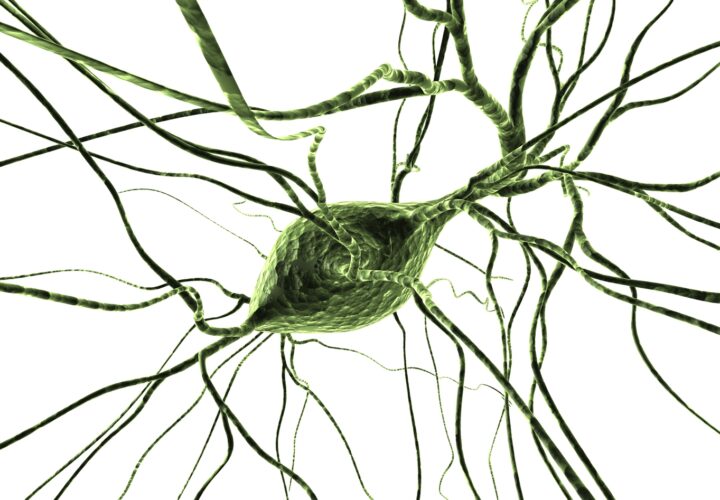Tau protein tangles (or neurofibrillary tangles) are a hallmark of Alzheimer’s disease, but what role do they play? First, you need to understand how a disease like Alzheimer’s spread across the brain. Degenerative diseases including Alzheimer’s, Parkinson’s and other dementias are “prion-like,” meaning they happen because proteins in the brain misfold and change their structure. Once one protein misfolds, the same process can spread to other parts of the brain, causing many cells to misfold. That results in what we call tau tangles. We spoke to Jeffrey Kordower, Ph.D., Director of Neurobiology at Rush University, about the correlation of tau protein tangles and brain degeneration, and how to prevent tau tangles from happening in the first place.
At a glance:
- We have the ability to clear beta-amyloid plaques, but that doesn’t reverse or prevent memory loss. Scientists like Kordower are now looking at abnormal tau proteins as having a stronger correlation with Alzheimer’s
- Immunotherapy may be one way to stop tau tangles from spreading, which uses antibodies to prevent the seed of one misfolded tau protein from traveling to another
- Many drugs aimed at clearing neurofibrillary tangles are in phase three clinical trials
Watch Full Video Interview Below:
Tau Protein Tangles vs. Amyloid Plaques — What Roles Do They Play in Alzheimer’s?
Being Patient: You have done a lot of research into Parkinson’s Disease, but now you’re looking into tau proteins. You are in the so-called “tau tangles camp,” meaning you suspect it plays a larger role than beta-amyloid plaques. Tell me a little bit about your research with tau protein and why you believe that tau may unlock a lot of the mystery around Alzheimer’s.
Jeffrey Kordower: I think many, if not all, degenerative diseases are what we call “prion-like.” They are caused when proteins that are normally found in the brain misfold for some reason. Then once they misfold, they’re able to spread from one place to another causing other cells to misfold. We believe that’s what’s involved with brain disease progression.
We know in Alzheimer’s disease that the disease probably starts in the brain in a region sort of on the lower side of the brain called the entorhinal cortex. That area is filled with neurofibrillary tangles (aka tau tangles). If you take someone who’s got very early Alzheimer’s disease but still has memory and cognitive deficits, that’s the area that has the most degeneration. And that’s the area that has the most neurofibrillary tangles.
Tau Tangles Are Strongly Correlated to Severity of Alzheimer’s Symptoms
Being Patient: But hasn’t science been working on the presumption that the amyloid plaques come first, followed by the tangles?
Jeffrey Kordower: We now have the ability to clear these plaques. But when you clear these plaques nothing happens. You could say that maybe they’ve already done their damage and there’s nothing to protect. But I think that the correlation between plaque load and cognitive dysfunction is very poor. And the correlation of tau pathology is much better, and actually [so is] the correlation of what we call synaptology, where the neurons project to a different area and they connect. Those connections are probably the most that correlate with cognitive dysfunction. So that’s what we’re trying to get at with tau proteins.
Being Patient: To what extent can we isolate how much damage has been caused postmortem in brain amyloid plaques versus neurofibrillary tangles?
Jeffrey Kordower: You only get one snapshot in a postmortem brain. What you have to do is look at a lot of different brains that have a spread of cognitive dysfunction in the patient population that were generous enough to donate these brains.
What you do is you look at patients who just have mild Alzheimer’s disease, patients who have severe Alzheimer’s disease and a scattering of brains in the middle. Then you look at tau tangle load versus amyloid load and what you find is that the tau load is much more correlative with the cognitive dysfunction.
What Drugs and Therapies Can Prevent Tau Protein From Becoming Neurofibrillary Tangles?
Being Patient: If abnormal tau protein is indeed confirmed to be a source of the damage of an Alzheimer’s brain, how does that change things and which direction would research go? What does it look like to prevent tau tangles?
Jeffrey Kordower: There are a number of approaches. The most popular one that’s emerging is called immunotherapy—to use antibodies to try and block the spread of what we call seeds. What you have is a cell that makes abnormal tau protein. And that tau secretes into the extracellular space—the space between cells—a seed of abnormal tau. That [seed] is picked up by a second cell and that second cell starts generating more and more abnormal tau. And then it secretes a little seed. And so the same thing happens over and over again. If you can block this seeding from one cell to another, what we call propagation, you should be able to block the degeneration that’s taking place over long periods of time, and you should be able to prevent the onslaught of cognitive demise.
Being Patient: We know that there are some tau drugs being tested right now. They’re in clinical three trials. Where are we in knowing whether the philosophy that a lot of the tau camp is betting on is right?
Jeffrey Kordower: Normally, tau protein would not misfold because there are organelles or parts of the cell that clear unwanted proteins, in a process called autophagy. Autophagy is sort of like your garbage disposal. You know, you put something in, you grind it up and it goes away. But what happens is with tau and other misfolded proteins like alpha synuclein, these garbage disposals in the cell stop working and you get more and more of the tau built up.
There are a number of ways to try and reduce tau and prevent that from happening. Some of these drugs may be trying to enhance the ability for the garbage disposal autophagy process to work better. I’m not sure of the timelines that are ongoing at the moment with these tau drugs. But a phase three clinical trial is basically the step before going into therapy. So we’re hopeful that they’ll be successful.
Related: Intermittent Fasting Improves Autophagy and Helps Clear Damaged Cells
Being Patient: Is there anything that we’ve learned from diseases such as Parkinson’s that could help us with Alzheimer’s disease?
Jeffrey Kordower: The idea that misfolded proteins propagate came originally from Parkinson’s disease. And this protein called alpha synuclien, which is normally found at the connection point between two cells, becomes misfolded and does this song and dance with these seeds to go across and propagate across the entire brain. And so people thought from there maybe tau protein and maybe amyloid can propagate from cell to cell. So these are very active areas of research.


I have a neurological disorder called corticobasil degeneration. which i have the tau build up in my cortex and basil area of my brain. because of this i have muscle stiffness on one side of my body.
Can you tell me will the immunotherapy help me? Please someone respond back.
Linda, Consult Your Physician – Being Patient does not give medical advice, nor is any information on the site intended to be prescriptive medical advice. If you have any questions about your health or the health of your loved one, please consult your physician for any and all medical-related questions. ~ Thank you.
Thank you for such a interesting an informative interview. where does one get more information about the 3 trails referenced?
Ant new treatment options……. what options do I have.?????